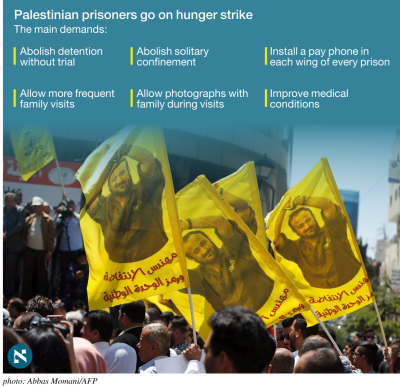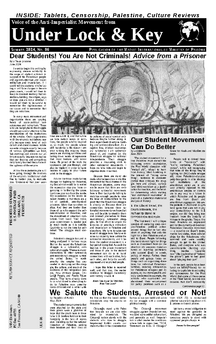
American Stooges put Palestinian Prisoner Marwan Barghouti in Solitary Confinement

[Reprinted from Proletarian Internationalist Notes https://pinotes.github.io]
Yesterday was Palestinian Prisoners’ Day. Yesterday was also two days after the fifteenth anniversary of intifada hero Marwan Barghouti’s illegal abduction from Ramallah in the occupied West Bank.
It is on this day that American-backed Israelis, in action opposing the two-state solution, chose to put Palestinian reconciliation and national unity symbol Marwan Barghouti in solitary confinement.(1)
Solitary confinement is a practice widely implemented as a form of discipline and political repression in the #1 prison state in the world, the United States. Used to repress protests of inhumane conditions, solitary confinement is itself widely considered inhumane particularly when done for long periods of time. Some Palestinians have been in solitary for years. Other kinds of worse treatment often accompany solitary confinement. It seems likely that Marwan Barghouti will be in solitary for several days at least.
A long-time prisoner himself with an immediate interest in the outcome of the protest like any of the other “security prisoners” in Israeli prisons, Barghouti was reportedly leading a large prisoner hunger strike against inhumane and illegal treatment of thousands of Palestinians in Israeli prisons. One of the things the prisoners are demanding is an end to solitary confinement, which it seems Barghouti could be in until the hunger strike ends. A mass hunger strike in 2014 lasted two months.(2)
Reactionaries are trying to get the public to associate the open hunger strike with the murder allegations against Barghouti. They are suggesting Barghouti is the only reason for the strike. The hunger-striking prisoners’ demands include an end to health negligence and an end to detention without trial. I$rael is holding hundreds of Palestinians without Israeli citizenship in administrative detention. Because of multiple anniversaries in 2017 related to the colonization and occupation of Palestine, massive protests would have happened whether Barghouti was alive or not.
Many in various countries do consider Marwan Barghouti – one of several imprisoned members of the Palestinian Legislative Council, belonging to different parties – to be Palestine’s “Mandela,” a potential future Palestinian president. Barghouti was taken by the imperialist settler formation and Amerikan outpost named “Israel” fifteen years ago and subjected to a show trial in a kangaroo court. An intifada figure and strong supporter of Palestinian nationalism and independence before and after being abducted, Barghouti is reportedly able to unite various groups of Palestinians in a way that few are. Many people in various countries already support Barghouti’s release.
Barghouti supported the Oslo Accords in the past. Azanian Anglican archbishop Desmond Tutu nominated Barghouti for the Nobel Peace Prize in June last year. At his show trial, Barghouti noted in Hebrew that he was a figure for peace for two peoples.
Barghouti has supported trying different approaches, permitted under international law, to ending an occupation that is illegal. Months and years after major waves of protest and resistance, there are still thousands of Palestinians in I$raeli prisons for resisting the illegal occupation and settlement. One of them happens to be Barghouti.
Since the I$raeli goon squad kidnapped Barghouti in 2002, the highly influential and extremely wealthy United $tates has had many years of chances under various presidents to secure Barghouti’s release. It hasn’t happened. Two-term Democratic president Barack Obama didn’t do it. Instead, Obama deceived Palestinians and gave Israel a record-breaking aid package. Obama sought to protect the image of Democrat warmongers and do-nothings, and the United States’ image, after now-President Trump won the U.S. election and it became obvious that the United States was going to lose its undeserved standing as a peacemaker.
The West Bank and East al-Quds (“Jerusalem”) already had tens of thousands of illegal settlers at the time of Ariel Sharon’s al-Aqsa provocation against the two-state solution in 2000. For years the United States has verbally supported the two-state solution and verbally opposed settlement construction, in land universally understood to be occupied territory, while hampering the two-state solution and supporting settlement construction in actuality. Whether Barghouti would ever be president or not, Barghouti’s continued detention is hampering processes Palestinians need to go through to arrive at important decisions with a higher level of unity.
The two-state solution isn’t total liberation of Palestine. Many Palestinian leaders and figures mediating Palestine’s international struggle support it. Some Palestinians consider the two-state solution a temporary step. According to survey reports, many support some approaches to it more than they support others. Though not always agreeing with or emphasizing some approaches to the two-state solution, Marwan Barghouti has supported it.
Despite internal disagreement about specific issues and non-Palestinians’ demoralizing statements about the ability to end and reverse settlement activity, the Palestinian nation as a whole is still struggling for the two-state solution in the midst of U.S. hindrance and the intransigence of some Zionist and non-Zionist elements in Israel. Palestinians and various Arabs and Muslims do not support the two-state solution any less than the Amerikans, who take advantage of conflict and violence in the Middle East, do. As discussed on this website [see notes], even Hamas and Iran support the two-state solution more than the United States does in reality.
Israelis have a chance to oppose West Bank annexation, oppose West Bank settlement activity, and support Palestinian independence. They have a chance to live in relative peace by ending their idolatrous attitude toward the United States and ending their dependence on that hegemonic, rogue aggressor for support in the midst of worsening conditions. However, the I$raeli entity stupidly chose to put Barghouti in solitary yesterday. In a month and a half is the fiftieth anniversary of the 1967 Israeli occupation of the Gaza Strip, the West Bank, and the Syrian Golan. It is possible the Hunger Strike for Freedom and Dignity will still be going on then.
Regardless of intent or how anyone feels about the two-state solution, the broad Palestinian unity around the prisoners’ hunger strike may be helping to promote Palestinian reconciliation and unity in other areas, and advance the two-state solution. That is true even though some of what the hunger strikers and prisoners are asking for could be won without freeing prisoners or winning a sovereign independent Palestinian state.
In the United States, there are also hunger strikes including strikes over solitary confinement.(3) So-called intersectionality in the Palestine-United States context is sometimes discussed in terms of pursuing equality with oppressors within a single state. Unity of Palestinians with various perspectives inside and outside prison, though, has the potential to contribute to Palestinian nationalism. Within U.S. prisons, unity of various whites and people in different non-white nations (including the Chican@ nation, the New Afrikan nation, and First Nations) often targets repression affecting many different prisoner demographics. This benefits the oppressed and activists inside prison, and can benefit fights for the self-determination of oppressed nations. Often this has nothing do with uniting Amerikans in general, or with advancing integrationism, which is a dead-end. Incarceration in the United States, and incarceration of so-called security prisoners and other Palestinians in I$raeli prisons, show oppressed nations’ need for self-determination.
In response to the Palestinian prisoners’ hunger strike, some are downplaying Palestinian unity or trying to take advantage of differences and discourage supporters by saying the strike is just about Barghouti. Yet, many different movements in Palestine have members in Israeli prison and are supporting the strike.
In a statement on the hunger strike, Barghouti refers to “mass” arbitrary detention and mistreatment and opposes occupation.(4) Barghouti refers to “the nation” to which prisoners belong, and “every national liberation movement in history.” Barghouti identifies Israel as an occupying power. The prisoners’ suffering is related to the suffering of the Palestinian nation.
“The eldest of my four children is now a man of 31. Yet here I still am, pursuing this struggle for freedom along with thousands of prisoners, millions of Palestinians and the support of so many around the world. What is it with the arrogance of the occupier and the oppressor and their backers that makes them deaf to this simple truth: Our chains will be broken before we are, because it is human nature to heed the call for freedom regardless of the cost.”
Among other things, Barghouti addresses collective punishments. “Palestinian prisoners and their families also remain a primary target of Israel’s policy of imposing collective punishments.”
“Among the hundreds of thousands of Palestinians whom Israel has taken captive are children, women, parliamentarians, activists, journalists, human rights defenders, academics, political figures, militants, bystanders, family members of prisoners. And all with one aim: to bury the legitimate aspirations of an entire nation.”
Some are using the failures of Amerika’s phony leadership as an excuse to oppose the two-state solution, Palestinian nationalism in general, and peace efforts in general. This is unfortunate. The United States must be opposed. In the international sphere, there needs to be new leadership in coordination with Palestine. Other countries need to influence Israel. Palestinian officials must give up any remaining illusions they might have about the Amerikans. The United States has proved uninterested in taking serious steps to resolve the conflict. In fact, it promotes and benefits from it. The United States, itself an illegitimate settler entity, is hegemonic, just gets in the way of real peace efforts, and is losing whatever credibility it had in the context of Mideast peace. The AmeriKKKan population has repeatedly proved willing to support or go along with U.S. aggression in the Middle East and, as a whole, is interested in the so-called Israeli-Palestinian conflict only enough to make things worse. The Amerikan population doesn’t really care about Jews and Muslims overseas. When it seems to care about their conditions, it exploits them for chauvinistic, jingoistic and warmongering purposes and to justify Amerikan corruption in the Middle East.
This writer understands why Israeli activists would want to focus on opposing their own country or its policies. However, globally there needs to be more opposition to the United States in order to advance Palestinian liberation. Various elements inside and outside Israel are accepting U.S. hegemony and failing to support Marwan Barghouti’s and other political prisoners’ release while opposing Palestinian nationalism and supporting amalgamation with settlers. That is unwise.
Israelis and the world must act to immediately end the folly of refusing to negotiate with Palestinian prisoners, and end the abuse of hunger strike leaders and participants. Marwan Barghouti and other leaders or political prisoners must be freed from solitary confinement and must be freed from prison. The practice of taking Palestinians to be imprisoned in Israel must stop. The world’s countries must support Palestinian independence and sovereignty regardless of the United States’ priorities and exert pressure and influence so that demands of the hunger-striking prisoners are met as long as Palestinians are in I$raeli prisons.
Related Articles:
- Lucasville Hunger Strike to End Solitary Confinement
- Hunger Strike Against Long-Term Isolation in Santa Rosa Jail
- Statement from 37 TN Prisoners on the Many Forms of Isolation in Solitary Confinement
- Missouri Long-Term Solitary Confinement Frameups and Torture
- Update on Ohio Hunger Strike for Medical Attention
- Force-Feeding Approved for CA Hunger Strikers
- 30,000 Spark California Hunger Strike
- Prisoners Plan Hunger Strike to Protest Wisconsin Long Term Isolation








